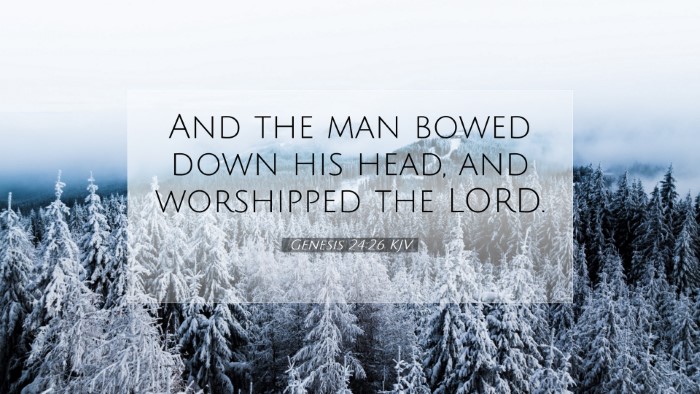Commentary on Genesis 24:26
Verse Reference: Genesis 24:26 - "And the man bowed down his head, and worshipped the LORD."
Introduction
Genesis 24 narrates one of the key moments in the patriarchal history of Israel where Abraham's servant is dispatched to find a wife for Isaac. This endeavor is infused with prayer, devotion, and divine guidance, culminating in the servant's acknowledgment of God's providence. In verse 26, the man refers to Abraham's servant, expressing a profound act of worship that serves as a pivotal moment in the narrative.
Contextual Analysis
The servant's journey symbolizes more than a mere search for a bride; it represents faithfulness to God's promises to Abraham regarding his descendants. The setting is replete with cultural significance, where marriage alliances were crucial for maintaining lineage and divine blessings. The act of bowing down in worship signifies reverence and recognition of God's omnipotence in guiding the servant's path.
Insights from Matthew Henry
According to Matthew Henry, this verse reveals the profound respect and humility the servant maintains towards God. Henry points out that the servant's act of bowing and worshipping indicates not only gratitude but also an acknowledgment that it is God who orchestrates the events of life. This reflects a humbling posture before divine sovereignty and an understanding that the success of his quest is rooted in the divine will.
- Gratitude: The servant’s worship stems from gratitude for God's guidance and the unfolding of His plan.
- Recognition of God's Role: It illustrates the importance of recognizing God's providential role in our endeavors.
Insights from Albert Barnes
Albert Barnes emphasizes the importance of the servant's worship in illustrating the relationship between human efforts and divine intervention. Barnes notes that despite the arduous journey and the cultural expectations surrounding marriage, the servant humbly submits to the will of God, highlighting that his success is not merely the fruit of his own labor but a clear manifestation of God's mercy and faithfulness.
- Divine Mercy: The act of worship signifies acknowledgment of God’s mercy in guiding the servant to a suitable spouse for Isaac.
- Human Effort Coupled with Divine Will: It underscores the theology that human endeavors must align with divine providence for them to bear fruit.
Insights from Adam Clarke
Adam Clarke asserts that the servant's worshipful response is pivotal in understanding the character of a faithful servant of God. Clarke elaborates that the act of bowing signifies a surrendering of personal ambition and an embrace of divine purpose. This instance serves as a model for all believers, as it calls them to remain steadfast in prayer and worship even amidst the complexities of their endeavors.
- Model of Faithfulness: The servant exemplifies what it means to have unwavering faith and reliance on God’s guidance.
- Importance of Worship: It serves as a reminder for believers to cultivate a life of worship that acknowledges God's hand in all circumstances.
Theological Implications
The response of the servant in Genesis 24:26 culminates in several theological implications:
- Understanding Providence: This act of worship illustrates the belief in God’s providence and His active role in the lives of those who serve Him.
- Prayer and Guidance: It emphasizes the importance of seeking divine guidance through prayer in all decision-making processes.
- Worship as Response: The response of worship becomes a model for believers, reinforcing that every success and blessing should be met with gratitude and reverence towards God.
Application for Pastors, Students, and Theologians
This verse and its accompanying insights prompt several applications for modern-day believers:
- Pastors: Cultivate environments in which congregants are encouraged to rely upon prayer and divine guidance, illustrating this through personal testimony.
- Students: Embrace humility and worship in their academic pursuits, reminding them that true success comes from God.
- Theologians: Continue to explore the intricate relationship between divine providence and human agency, fostering deeper discussions in ecclesiastical contexts.
Conclusion
In Genesis 24:26, we find more than a mere historical account; we uncover a profound theological principle woven through the fabric of faith—the importance of humility, prayer, and worship in the life of the believer. By studying this verse through the lenses of Matthew Henry, Albert Barnes, and Adam Clarke, we are invited to reflect on our own responses to God’s guidance and to emulate the servant's heart of devotion. As we approach our tasks with a spirit of worship, we too can experience the unfolding of God's plans in our lives.


